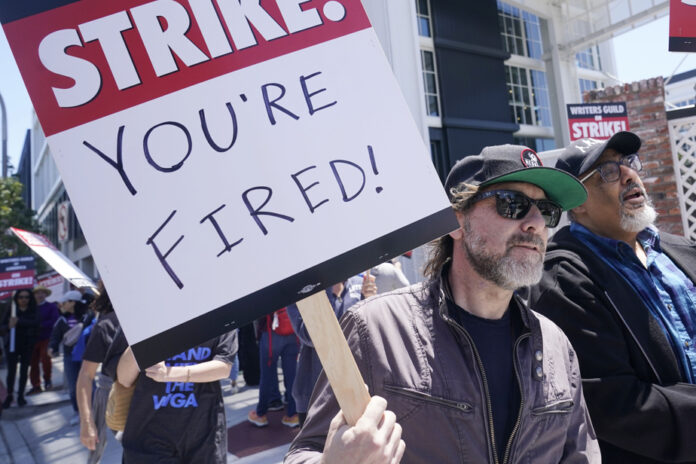(Los Angeles) Thousands of American television and film screenwriters began a strike on Tuesday due to the failure of negotiations with the main studios and platforms relating in particular to an increase in their remuneration.
In Los Angeles as in New York, pickets formed in front of the studios.
“The screenwriters are not paid enough”, especially in view of their “long hours” of work, said Louis Jones, a screenwriter on strike interviewed by AFP outside the Netflix studios in Los Angeles.
This social movement will result in the immediate suspension of hit shows, such as late-night shows, and major delays for television series and films scheduled for release this year.
The studios’ responses to the requests have been “grossly inadequate, given the existential crisis screenwriters face,” said the powerful writers’ union, the Writers Guild of America (WGA).
The strike call was relayed on social media. “Drop your pens!” “, thus urged on Twitter Caroline Renard, screenwriter of several series.
Jimmy Fallon and Stephen Colbert, famous hosts of two popular late-night shows, showed their support at the Met Gala in New York on Monday night.
“I support my team,” Jimmy Fallon said, noting that he “couldn’t make the show without them.”
For Stephen Colbert, “the demands of the screenwriters are not unreasonable”.
“I am a member of the union and I support collective bargaining. This country owes a lot to trade unions,” he added.
The last major social movement in Hollywood dates back to the writers’ strike that paralyzed the American audiovisual industry in 2007-2008. A 100-day conflict that had cost the sector two billion dollars.
Major studios and platforms, including Disney and Netflix, represented by the Alliance of Motion Picture and Television Producers (AMPTP) announced on Monday night that talks with the WGA “had concluded without an agreement.”
Screenwriters are demanding higher pay, minimum guarantees for stable employment and a greater share of the profits generated by the rise of digital broadcasting. Their employers, they say, make a profit and raise the salaries of their leaders.
They believe that they have never been so numerous to work at the minimum wage set by the unions, while the television networks hire fewer people to write increasingly short series.
For their part, studios say they have to cut costs due to economic pressures.
If the AMPTP claims to have offered screenwriters an increase in remuneration, it opposes several demands, in particular the revision of the remuneration of screenwriters of series broadcast on the internet, which often remain visible on platforms for years.
For decades, screenwriters have collected “residual rights” for the reuse of their works, for example in TV reruns or DVD sales.
This is either a percentage of the revenue earned by the studios for the film or show, or a fixed sum paid for each rerun of an episode.
With digital distribution, authors receive a fixed amount each year, even in the event of global success for their work, such as the Bridgerton or Stranger Things series, seen by hundreds of millions of viewers around the world.
The WGA is calling for the revaluation of these amounts.
The studios point out that the “residual rights” paid to screenwriters reached an all-time high of $494 million in 2021, compared to $333 million a decade earlier, largely thanks to the explosion in screenwriting jobs linked to the increasing demand for digital broadcasting.
Having been spendthrift in recent years, when rival broadcasters have sought to boost subscriber numbers at all costs, the bosses stress they are now under heavy pressure from investors to cut spending and make a profit.
And they deny pretexting economic difficulties to strengthen their position in negotiations with screenwriters.





